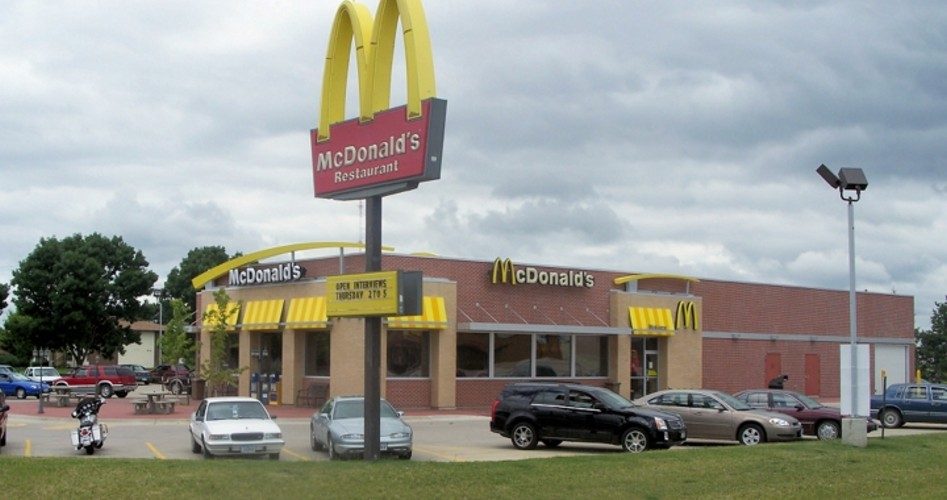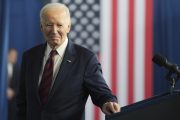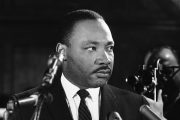
The ruling by the general counsel of the National Labor Relations Board (NLRB) that McDonald’s is actually a huge employer of more than 175,000 workers in the United States, rather than a franchisor with thousands of independent franchisees, will, if it is upheld, allow the Service Employees International Union (SEIU) to recruit those workers much more easily.
The ruling was supposedly about low wages and local disputes with a few of those franchisees, but it had precious little to do with that carefully crafted public perception.
Richard Griffin, the NLRB’s general counsel, said he investigated more than 180 claims by local McDonald’s’ workers that they were being penalized for protesting low wages in a series of one-day strikes earlier this year. He found 43 of them to be “valid” and, in the process, ruled that McDonald’s itself would be held jointly liable for any penalties along with the individual franchisees.
The New York Times, to its credit, saw through the scam, calling it “a decision that, if upheld, would disrupt longtime practices in the fast-food industry and ease the way for unionizing nationwide.” (Emphasis added.)
Griffin claims that because McDonald’s not only owns most of the real estate and buildings used by its franchisees but also tightly controls the operations of each outlet, even down to noting when labor costs are getting out of line compared to company guidelines, therefore McDonald’s itself is really the employer of all of the employees working at all of those outlets. He held this to be true even though McDonald’s corporate has no say in who is hired, what they are paid, and what hours each employee works.
Julius Getman, a labor lawyer at the University of Texas, agreed with Griffin’s ruling, claiming,
Employers like McDonald’s seek to avoid recognizing the rights of their employees by claiming that they are not really their employer, despite exercising control over crucial aspects of the employment relationship.
McDonald’s should no longer be able to hide behind its franchisees.
The pushback to Griffin’s ruling was immediate. McDonald’s said it is looking at the ruling and is likely to appeal it. A senior VP for McDonald’s, Heather Smedstad, said “this decision changes the rules for thousands of small businesses and goes against decades of established law.”
This was echoed by Angelo Amador, vice president for the National Restaurant Association, who said Griffin “overturns 30 years of established law … erodes the proven franchisor-franchisee relationship, and jeopardizes the success of 90 percent of America’s restaurants who are independent operators or franchisees.”
The International Franchise Association explained that those franchisees are independent business owners who operate their own businesses:
Franchisees and their employees do not work for franchisors. The franchise owners who have built more than 770,000 businesses and employ millions of people control their own businesses. Franchisees have their own employer identification number with the Internal Revenue Service and file their own taxes. Franchisees establish day-to-day operations, employment practices and policies for their own businesses. Franchisees decide who to hire and fire, and also set wage rates, benefits and employees’ work schedules.
It went on to say: “If franchisors are joint employers with their franchisees, these thousands of small business owners would lose control of the operations and equity they worked so hard to build.”
David French, a senior vice president with the National Retail Federation, saw that the decision reflected the NLRB’s extreme pro-labor agenda, calling it “just a government agency that serves as an adjunct for organized labor, which has fought for this decision for a number of years as a means to more easily unionize entire companies and industries.”
The SEIU has been targeting McDonald’s since late 2012, starting in New York City, enlisting the support from some local workers and persuading them to engage in what they called “non-violent civil disobedience,” a reference to the civil rights movement decades earlier. The SEIU-spawned protests escalated earlier this year when more than 130 of those protesters were arrested at a McDonald’s shareholders’ meeting. The SEIU recruited them under the slogan “Fight for $15,” an effort to promote a $15 minimum wage, without mentioning the real purpose behind its efforts: If Griffin’s ruling is upheld, recruiting for the SEIU would be vastly easier and less costly, and would generate enormous financial gains for the union.
Jeffrey Dorfman, writing in Forbes, did the math:
The potential implications are enormous. There are over 3.5 million fast food workers. Checking some SEIU locals, it appears that dues average about 1.8 percent of earnings. For an average fast food worker, that could translate into $250 to $300 per year, or around $20 to $25 per month. Taking the low number, SEIU could potentially capture a new revenue stream of over $800 million annually.
McDonald’s is just the first target, but all by itself it’s a juicy one. Added Dorman:
Just with McDonald’s, there could be around 750,000 employees in their U.S. restaurants. Those union dues could be worth $150 million per year or more. It would be too expensive for the SEIU to negotiate individually with each restaurant operator who employs 40-50 workers per store. Holding over ten thousand organizing drives and elections would be far too difficult and time-consuming. What the SEIU wants, and what the NLRB is trying to give it, is the ability to deal with one entity (McDonald’s, the franchiser), hold one election, and suddenly gain a huge batch of new dues-paying members.
One important element missing from all the expressions of angst and delight over Griffin’s ruling is any mention of the general counsel himself. Griffin’s background is so tawdry and tainted with union corruption that when President Obama nominated him, Senate Majority Leader Harry Reid moved heaven and earth to keep his record from being made public. The Senate’s Committee on Health, Education, Labor and Pensions, headed up by pro-labor Senator Tom Harkin (D-Iowa), didn’t even conduct a confirmation hearing and his nomination headed for a floor vote immediately.
Prior to his nomination, Griffin was general counsel to the International Union of Operating Engineers (IUOE) dating back to 1983. During that period, more than 60 IUOE members have been arrested, indicted, or jailed on charges of labor racketeering, extortion, criminal behavior, bodily harm, and workplace sabotage. In one specific instance with which Griffin was no doubt aware, on April 9, 2008 a dozen high-ranking members of an IUOE local in Buffalo, New York, were arrested, according to Fox News, for:
Damaging more than 40 pieces of heavy machinery at construction sites where non-union workers were hired. They poured sand into oil systems and cut tires and fuel lines.
They also ran license plate numbers of [vehicles belonging to] victims through a state database to get personal information, including the names and addresses of victims’ wives.
So putrid and rancid was his background that Fred Wszolek, writing for Townhall.com, called him “an embarrassment of a nominee” and outlined a few of the more salient events that should have disqualified him for the position of NLRB’s general counsel:
Griffin participated in a conspiracy to manipulate the operation of Local 501 “through a pattern of racketeering activity.” Griffin was served with the complaint and a court summons.
He noted further the details of that “racketeering activity,” which included a “scheme to defraud [the local chapter] out of revenue … by means of kickbacks, bribery, violent threats and extortion. The suit names dozens of IUOE officials as defendants and Mr. Griffin is highlighted in a section describing an embezzlement and its subsequent hush-up.”
Further investigation reveals not only that Obama nominated Griffin to the NLRB but that the SEIU paid much for Obama’s presidency in 2008. According to the Washington Examiner, the union invested $28 million into Obama’s campaign, making the union the “organization that spent the most to help Barack Obama get elected president.”
Round and round she goes: Obama gets much needed support from the SEIU. Obama appoints Griffin to the NLRB as general counsel. Reid accommodates by effectively hiding his criminal background, and the Senate confirms him. The SEIU targets McDonald’s in its never-ending quest for more members and revenues. The case goes up to the NLRB where Griffin is just waiting for the opportunity to change 30 years of labor law and give the SEIU a return on its $28 million investment in Obama.
Photo of “New McDonald’s restaurant in Mount Pleasant, Iowa”: http://www.flickr.com/photos/nnecapa/
A graduate of Cornell University and a former investment advisor, Bob is a regular contributor to The New American magazine and blogs frequently at www.LightFromTheRight.com, primarily on economics and politics. He can be reached at [email protected].



